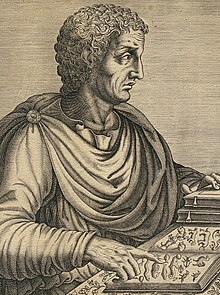
Back Plinius die jongere Afrikaans Plinius der Jüngere ALS Plinio o Choven AN بلينيوس الأصغر Arabic بلينيوس الاصغر ARZ Pliniu "El Mozu" AST Kiçik Plini Azerbaijani Пліній Малодшы Byelorussian Плиний Млади Bulgarian Plinius ar Yaouankañ Breton
Pliny the Younger | |
|---|---|
Gaius Plinius Caecilius Secundus | |
 Engraving of Pliny the Younger | |
| Born | Gaius Caecilius Cilo AD 61 |
| Died | c. AD 113 (aged c. 52) Bithynia, Roman Empire |
| Occupation(s) | Politician, judge, author |
| Notable work | Epistulae |
| Parents |
|
| Relatives | Pliny the Elder (uncle, later adoptive father) |
Gaius Plinius Caecilius Secundus (born Gaius Caecilius or Gaius Caecilius Cilo; 61 – c. 113), better known in English as Pliny the Younger (/ˈplɪni/ PLIN-ee),[1] was a lawyer, author, and magistrate of Ancient Rome. Pliny's uncle, Pliny the Elder, helped raise and educate him.
Pliny the Younger wrote hundreds of letters, of which 247 survived, and which are of great historical value. Some are addressed to reigning emperors or to notables such as the historian Tacitus. Pliny served as an imperial magistrate under Trajan (reigned 98–117),[2] and his letters to Trajan provide one of the few surviving records of the relationship between the imperial office and provincial governors.[3]
Pliny rose through a series of civil and military offices, the cursus honorum. He was a friend of the historian Tacitus and might have employed the biographer Suetonius on his staff. Pliny also came into contact with other well-known men of the period, including the philosophers Artemidorus and Euphrates the Stoic, during his time in Syria.[4]
- ^ Melvyn Bragg (December 12, 2013). "Pliny the Younger". In Our Time (Podcast). BBC Radio 4. Retrieved January 26, 2020.
- ^ Bennett, Julian (1997). Trajan: Optimus Princeps: A Life and Times. New York & London: Routledge. pp. 113–125.
- ^ John W. Roberts, ed. (2007). "Pliny the Younger". The Oxford Dictionary of the Classical World. Oxford: Oxford University Press. ISBN 9780192801463. Retrieved March 24, 2014.
The tenth bk. of letters contains all of Pliny's correspondence with Trajan. [...] The provincial letters are the only such dossier surviving entire, and are a major source for understanding Roman provincial government.
(subscription required) - ^ Shelton, Jo-Ann (2013). The Women of Pliny's Letters. Women of the Ancient World Series. New York, NY: Rutledge. pp. 159–161. ISBN 978-0-203-09812-7.